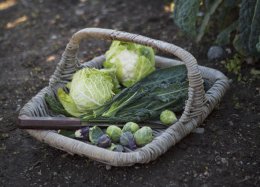
 GETTY
GETTY
It's a time-old tale that eating fruit and vegetables is good for you - it can help boost your immune system and stave off cravings for fatty foods.
But who knew some fruit and veg can actually stop you losing weight? A study by the Harvard School of Public Health has revealed the truth behind handful of 'healthy foods'.
Related articles
Talk about a wolf in sheep's clothing, it would seem sweetcorn is the worst offenders - with people who added an extra portion of the golden kernels to their diet gaining, on average, 2.4lbs.
Next on the hit list is everyone's favourite Sunday dinner accompaniment: peas. The little green treats made testers gain a whopping 1.13lbs when added to their diet every day, it's been claimed.
 GETTY
GETTY
We all know potatoes are starchy carbohydrates - and should probably be looked at as a treat - and Harvard's study backs this up.
Cabbage, onions and peaches made up the next on the list to avoid eating too regularly.
The Harvard School of Public Health analysis detailed the dietary information provided by more than 130, 000 American men and women to come to these conclusions.
Every four year - for up to a whopping 24 years - the subjects answered questions about how often they ate 131 different foods, were weighed regularly and handed over information about smoking, exercise, TV watching and other aspects of their lifestyle.
Cabbage, onions and peaches are all on the list of 'bad' fruit and vegAt the other end of the scale we have some incredibly hard-working fruit and vege, not only good for you but helping to shift those pounds.
Blueberries are the best of the best, with Harvard claiming those who added them to their diet lost on average 1.38lbs.
Next up Cauliflower then prunes and finally pears - all great for health, fitness and weight loss.
Next time you're pushing a trolley down the fruit and vegetable isle of your local supermarket, it might be worth keeping this study in mind.
INTERESTING VIDEO












